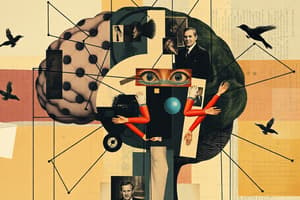Podcast
Questions and Answers
What does biological psychology primarily study?
What does biological psychology primarily study?
Which system is NOT one of the key biological systems that influence behavior?
Which system is NOT one of the key biological systems that influence behavior?
How does the biological approach explain visual perception?
How does the biological approach explain visual perception?
What impact can low serotonin levels in the brain have on an individual?
What impact can low serotonin levels in the brain have on an individual?
Signup and view all the answers
Which historical practice relates to early attempts to address neurological and mental issues?
Which historical practice relates to early attempts to address neurological and mental issues?
Signup and view all the answers
What is considered the basic unit of nervous structure?
What is considered the basic unit of nervous structure?
Signup and view all the answers
Which part of the neuron is responsible for receiving signals from other cells?
Which part of the neuron is responsible for receiving signals from other cells?
Signup and view all the answers
What component of the neuron contains the nucleus and is involved in biochemical processes?
What component of the neuron contains the nucleus and is involved in biochemical processes?
Signup and view all the answers
What analogy is used to describe how neurons communicate?
What analogy is used to describe how neurons communicate?
Signup and view all the answers
According to Neuron Theory, how are neurons characterized?
According to Neuron Theory, how are neurons characterized?
Signup and view all the answers
Study Notes
Biological Basis of Behavior
- Biological psychology, also known as biopsychology, psychobiology, physiological psychology, or behavioral neuroscience, studies the connection between biological processes and human behavior.
- The field has roots in ancient practices like Trepanation (around 3000 BCE) but became scientific in the 20th century with advances in brain research.
- Key concepts include neurons, synapses, and understanding how physiological mechanisms influence mental processes and behaviors.
Key Biological Systems
- The three critical biological systems controlling behavior and mental processes are:
- Neural system
- Nervous system
- Endocrine system
Neurological Basis of Behavior
- Neurons are the fundamental units of the nervous system, with approximately 90 billion nerve cells and 100 trillion neural connections in the human brain.
- The term "neuron" originates from the Greek word for nerve and was established as a discrete cell type by Sir Santiago Ramón y Cajal, the father of Neuron Theory.
Structure and Functions of Neurons
- Neurons have tree-like structures:
- Dendrites: Receive signals from other cells.
- Soma (Cell Body): Contains the nucleus and integrates synaptic information before transmitting signals.
- Axon: Transmits impulses away from the cell body to other neurons or muscles.
- Myelin Sheath: Insulates the axon and facilitates faster signal transmission.
- Nodes of Ranvier: Gaps in the myelin sheath that enable rapid conduction of nerve impulses.
Types of Neurons
- Unipolar Neurons: One process (axon) extending from the cell body, found in peripheral nervous system ganglia.
- Bipolar Neurons: Two processes (one axon, one dendrite), located in sensory organs like the retina.
- Multipolar Neurons: Many processes (many dendrites and one axon), prevalent in the brain and spinal cord.
Functional Variations of Neurons
- Sensory Neurons: Receive external stimuli and send information to interneurons; generally unipolar.
- Interneurons: Connect sensory and motor neurons entirely within a single structure; usually multipolar.
- Motor Neurons: Carry information away from the spinal cord to muscles; primarily multipolar.
Nerve Impulse Transmission
- Nerve impulses are brief electrical spikes that travel via axons using electrochemical signals; speeds range from 1 to 120 meters per second.
Mechanisms of Nerve Impulse
- Resting Potential: The inactive state of a neuron, typically -70 mV, where the inside is more negative than the outside due to ion distribution.
- Action Potential: Occurs when a neuron reaches a threshold of -55 to -65 mV, resulting in a rapid depolarization as sodium ions flow in, following the All-or-None Law.
- Saltatory Conduction: Action potential jumps between Nodes of Ranvier in myelinated axons, enhancing conduction speed.
- Refractory Period: The phase after an action potential, during which the neuron cannot fire again; includes absolute and relative refractory periods related to sodium and potassium ion movements.
Studying That Suits You
Use AI to generate personalized quizzes and flashcards to suit your learning preferences.
Description
Explore the essential functions and structures of the biological-psychological systems that underlie human behavior in this chapter. Analyze how physiology, mental processes, and behavior are interconnected, as well as the roles of neural, hormonal, and genetic mechanisms. Prepare to deepen your understanding of human behavior from a biological perspective.



